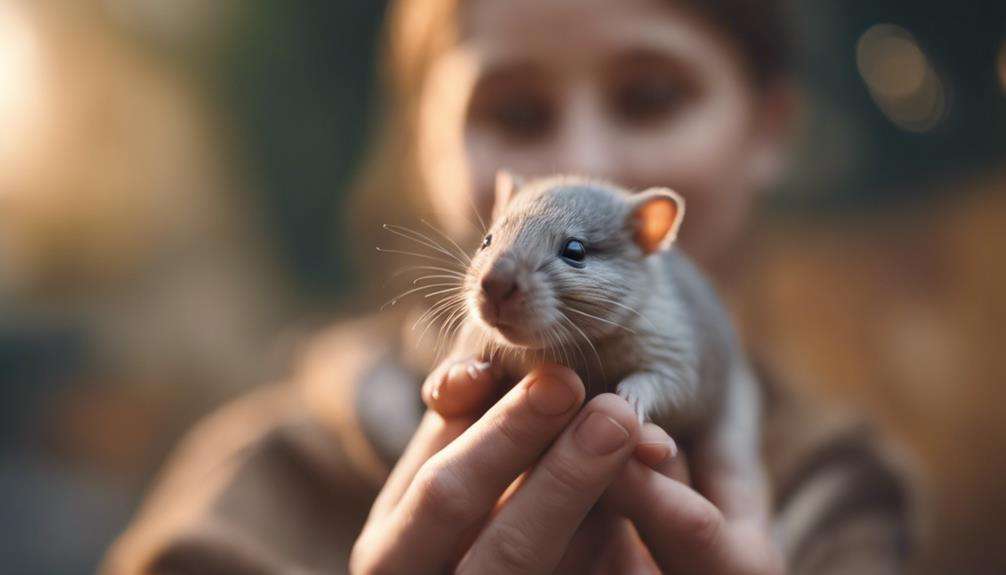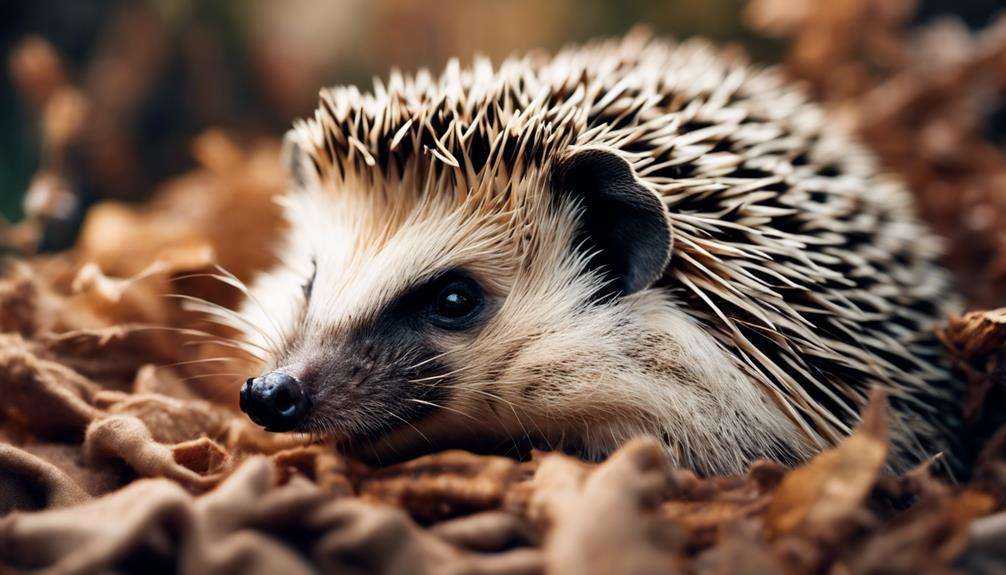When embarking on the journey of caring for a mammal, have you ever wondered if there are essential tips that could make the process smoother and more rewarding? Understanding the nuances of mammal care can be a fulfilling experience, and the key to success lies in mastering the basics.
As you navigate the world of beginner mammal care, uncovering the top 10 tips can be a game-changer in ensuring the well-being and happiness of your new furry companion.
Key Takeaways
- Choose an exotic mammal that suits your lifestyle and environment.
- Provide a spacious and enriching enclosure for your mammal's well-being.
- Offer a balanced diet tailored to your mammal's species requirements.
- Understand and cater to your mammal's social and behavioral needs for a fulfilling life.
Choosing the Right Exotic Mammal
When selecting an exotic mammal as a pet, it's crucial to consider various factors to ensure a suitable match for your living space, lifestyle, and level of commitment. Exotic pets come in various sizes, ranging from small animals like sugar gliders to larger ones such as fennec foxes. It's essential to choose a mammal that fits comfortably within your living environment and daily routine.
Researching the specific care requirements of different exotic mammals is vital to ensure that you can meet their needs adequately. Understanding the lifespan of the exotic mammal species you're interested in is essential as it will give you insight into the long-term care and responsibility involved. Additionally, assessing the availability of veterinary care for the chosen exotic mammal is crucial for providing proper healthcare when needed.
Lastly, looking into the legal regulations concerning exotic mammal ownership in your area is necessary to ensure compliance and prevent potential issues down the road.
Setting Up the Perfect Enclosure
To create an ideal habitat for your exotic mammal, carefully select the enclosure size and materials based on the specific needs of the species you're caring for. When setting up the perfect enclosure, consider the following:
- Size Matters: Ensure the enclosure is appropriate for the size of your mammal, providing enough space to move freely and exhibit natural behaviors. A small enclosure can lead to stress and health issues, so make sure it's spacious enough for your mammal to thrive.
- Comfortable Bedding: Choose suitable bedding material such as hay, shredded paper, or aspen shavings, depending on the species requirements. Bedding serves not only as a comfortable resting place but also helps maintain cleanliness and hygiene within the enclosure.
- Cozy Hideouts: Include hiding spots like tunnels, small caves, or nest boxes to offer your mammal privacy and security. These areas are essential for reducing stress levels and providing a safe retreat when needed.
Providing a Nutritious Diet

For optimal health and well-being, ensure your exotic mammal's diet is rich in high-quality pellets, fresh hay, and fresh vegetables every day. Offering a balanced diet that meets your mammal's nutritional needs is crucial for their overall health. High-quality pellets provide essential vitamins and minerals, while fresh hay helps with digestion and keeps their teeth healthy. Fresh vegetables are also important as they offer additional nutrients and variety to their diet. It's vital to provide fresh, clean water at all times to keep your mammal properly hydrated.
To ensure your mammal stays healthy, avoid feeding them foods high in sugar, salt, or fat, as these can lead to obesity and dental issues. Researching the specific dietary requirements of your mammal's species is essential to tailor their diet accordingly. Regularly monitor your mammal's weight and adjust their food intake as needed to maintain a healthy body condition. By paying attention to their diet and nutritional needs, you can help your exotic mammal thrive in your care.
Understanding Behavioral Needs
Understanding the natural behaviors of small mammals, such as rabbits, guinea pigs, and hamsters, is crucial for providing appropriate care that promotes their overall well-being. When caring for these adorable pets, it's essential to consider their behavioral needs:
- Socialization: Small mammals are social creatures that thrive on interaction. Providing opportunities for socialization with humans or other compatible animals can prevent loneliness and ensure their mental well-being.
- Enrichment Activities: Offering enrichment activities like puzzle feeders, tunnels, or toys can stimulate their minds, prevent boredom, and encourage natural behaviors such as foraging and climbing.
- Mental Stimulation: Small mammals, like rats and mice, have intricate social structures and communication methods. Providing mental stimulation through toys and activities that challenge their cognitive abilities can keep them mentally active and engaged.
Handling and Socializing Tips

When handling small mammals, remember to be gentle and confident, as this builds trust and reduces stress.
Daily interaction, positive reinforcement, and treats are key to socializing your small mammals and fostering a strong bond.
Providing safe and comfortable environments for socialization sessions is crucial for helping your small mammals feel secure and relaxed.
Proper Holding Techniques
Implementing proper holding techniques is essential for ensuring the comfort and safety of small mammals like rabbits and guinea pigs. When handling these pocket pets, remember to support their hindquarters to prevent spine injuries.
Socializing small exotic mammals from a young age is crucial in helping them feel more at ease with human interaction and reducing stress. Additionally, avoiding sudden movements or loud noises during handling is vital to prevent frightening or stressing them out.
Using treats and positive reinforcement can help these small mammals associate handling with positive experiences. Regular, gentle handling not only aids in building trust but also strengthens the bond between you and your furry companion over time.
Bonding With Your Pet
To foster a strong bond with your pet mammal, prioritize regular, gentle handling and positive social interactions from an early age. Handling your pet with care and respect helps build trust and strengthens the bond between you.
Socializing your pet mammal through treats and gentle interactions creates positive experiences, encouraging trust and reducing fear. It's crucial to pay attention to your pet mammal's body language cues to understand their comfort level during bonding sessions.
Providing a safe and quiet environment for these interactions will help your pet mammal feel secure and relaxed. Consistent and patient handling won't only enhance the bond between you and your pet but also contribute to their overall well-being.
Socializing With Other Animals
For successful socialization with other animals, ensure that small mammals are introduced gradually and under supervision to prevent aggressive interactions and promote a safe environment for all pets involved.
When handling small exotic mammals like rabbits or guinea pigs, supporting their hindquarters is crucial to prevent injury and ensure comfort.
Here are some key tips for socializing small mammals with other animals:
- Supervise Interactions: Always supervise interactions between small mammals and other pets to prevent stress or aggressive behavior.
- Gradual Introductions: Introduce small mammals to other animals slowly and in a controlled environment to allow them to adjust comfortably.
- Monitor Body Language: Watch for positive or negative body language and behavior in both the small mammal and the other animal to ensure a harmonious interaction.
Maintaining Proper Hygiene

To maintain proper hygiene for your mammal, it's crucial to establish a regular cage cleaning schedule to prevent the accumulation of harmful bacteria.
Make sure to have the necessary grooming tools on hand to keep your pet clean and well-groomed at all times.
Additionally, understanding the bathing frequency guidelines specific to your mammal's species will help you maintain their hygiene effectively.
Cage Cleaning Schedule
Maintaining proper hygiene for your small mammal involves creating a regular cage cleaning schedule that includes daily spot cleaning and weekly deep cleaning. Follow these tips to ensure a clean environment for your pet:
- Daily Spot Cleaning – Remove uneaten food, soiled bedding, and waste promptly to prevent the accumulation of bacteria and odors.
- Weekly Deep Cleaning – Perform a thorough cleaning of the entire cage, including changing bedding and washing accessories, to maintain a hygienic living space for your mammal.
- Use Pet-Safe Cleaning Products – Choose cleaning products specifically designed for small mammal cages to ensure hygiene without any harmful effects on your pet's health.
Proper cage maintenance is crucial for the overall wellbeing of your small mammal companion.
Grooming Tools Needed
To ensure your small mammal's overall hygiene and health, acquiring the necessary grooming tools is essential for maintaining their cleanliness and well-being.
For exotic small mammals, such as hamsters, guinea pigs, or rabbits, a soft brush or comb is crucial to remove loose fur and prevent matting. Small nail clippers designed for pets are necessary to keep their nails trimmed to a safe length, ensuring they don't get caught or become overgrown.
Dental hygiene is also important, so using a small toothbrush or finger brush with pet-safe toothpaste will help maintain their oral health. Additionally, ear wipes or solutions are crucial for gently cleaning ears and preventing infections in small mammals.
Regular grooming sessions not only maintain hygiene but also help strengthen the bond between pet and owner.
Bathing Frequency Guidelines
For optimal small mammal care and hygiene, it's crucial to understand the appropriate bathing frequency guidelines. When caring for your exotic animal, such as small mammals like rabbits and guinea pigs, it's important to note that bathing is generally not recommended unless necessary. Here are essential guidelines to consider:
- Avoid Over-Bathing: Small mammals can suffer from dry skin and irritation if natural oils are stripped away.
- Consult a Veterinarian: Seek advice from a vet experienced in small mammal care to determine if your pet requires bathing and the recommended frequency.
- Research Specific Needs: Different small mammals have varying grooming requirements, so understanding your pet's needs is crucial for their well-being.
Recognizing Signs of Illness

If you notice any subtle changes in your small mammal's behavior, appetite, weight, breathing, or physical appearance, these could be signs of illness.
Small mammals, especially exotic pets, may exhibit indicators like changes in fur, abnormal discharges, or lethargy when unwell.
Regularly monitoring your pet's habits and appearance is crucial for early detection of potential health issues.
Exotic mammals might mask signs of illness, underscoring the importance of close observation and prompt veterinary care.
If you observe any abnormal behavior or physical changes, seeking immediate medical attention is necessary.
A thorough physical exam by a veterinarian can help identify underlying health problems and guide appropriate treatment.
Creating an Enriching Environment
Noticing signs of illness in your small mammal is crucial for their well-being; now, let's focus on creating an enriching environment to support their health and happiness. To ensure your pet's well-being and provide a stimulating space for them, follow these tips:
- Provide Plenty of Hiding Spots and Tunnels: Small mammals feel secure when they've places to hide and explore. Adding tunnels and hiding spots in their habitat will encourage natural behaviors and reduce stress.
- Offer a Variety of Toys and Chews: Keep your pet entertained and mentally stimulated by providing a range of toys and chews. This will prevent boredom and promote physical activity, essential for the care of small mammals.
- Include Different Textures and Materials: Engage your pet's senses by incorporating various textures like fleece, wood, and paper in their environment. This diversity will encourage exploration and keep your small mammal active and curious.
Regular Veterinary Check-Ups

Regular veterinary check-ups are essential for maintaining the health and well-being of your exotic mammal. These check-ups are crucial as exotic mammals often conceal signs of illness, making it challenging for owners to detect problems without professional help.
By scheduling regular visits with a specialized exotic veterinarian, you can ensure comprehensive care for your small mammal. During these check-ups, preventive measures like vaccinations and parasite prevention are typically administered to safeguard your exotic pet's health.
Establishing a consistent veterinary check-up schedule not only helps in early detection of any potential health issues but also contributes to the overall longevity and well-being of your exotic mammal. Remember, routine veterinary examinations play a vital role in monitoring your pet's health status and providing necessary guidance for their care.
Prioritizing regular veterinary check-ups is a proactive approach to ensure that your exotic mammal remains healthy and happy in your care.
Building a Bond With Your Mammal
To strengthen the bond with your exotic mammal, engage in daily interactions that foster trust and connection, such as petting, playing, and verbal communication. Building a strong bond with your mammal is crucial for their well-being and your relationship. Here are some tips to help you establish a deep connection:
- Quality Time: Spend dedicated time each day interacting with your mammal. This could include playing with their favorite toys, engaging in training sessions, or simply cuddling together.
- Positive Reinforcement: Use treats and praise to reinforce good behavior. Positive reinforcement helps build trust and strengthens the bond between you and your mammal.
- Respect Body Language: Learn to interpret your mammal's body language to understand their feelings and needs better. This will enable you to communicate effectively and respond appropriately, further enhancing your bond.
Frequently Asked Questions
What Is the Easiest Mammal Pet to Take Care Of?
If you're looking for a low-maintenance, beginner-friendly pet, consider guinea pigs. They are gentle, social creatures with simple dietary needs. Providing a spacious cage, proper grooming, and regular vet check-ups will ensure their well-being and longevity.
What Are Some Basic Tips for Caring a Pet?
When caring for a pet, ensure you meet their feeding habits and establish a regular grooming routine. Incorporate exercise and training techniques to keep them healthy and well-behaved. Consistent care and attention are key to your pet's well-being.
How Do You Take Care of Mammals?
To take care of mammals, engage in enrichment activities like foraging toys. Recognize common health concerns such as obesity. Prioritize mental and physical well-being by providing a stimulating environment. Regularly monitor health and seek veterinary care as needed.
What Are the 7 Basic Needs of a Dog?
To meet a dog's needs, ensure balanced nutrition, consistent exercise, and proper grooming practices. Training for mental stimulation, regular vet check-ups, and vaccinations are essential for long-term health. Provide a safe environment for emotional well-being.
Conclusion
In conclusion, caring for a mammal can be as rewarding as nurturing a delicate flower in bloom.
By following these top 10 tips for beginner mammal care, you're laying the foundation for a fulfilling and enriching relationship with your furry companion.
Remember, just like a gardener tends to their plants with care and dedication, so too must you nurture your mammal with love, patience, and commitment.
Happy caregiving!






